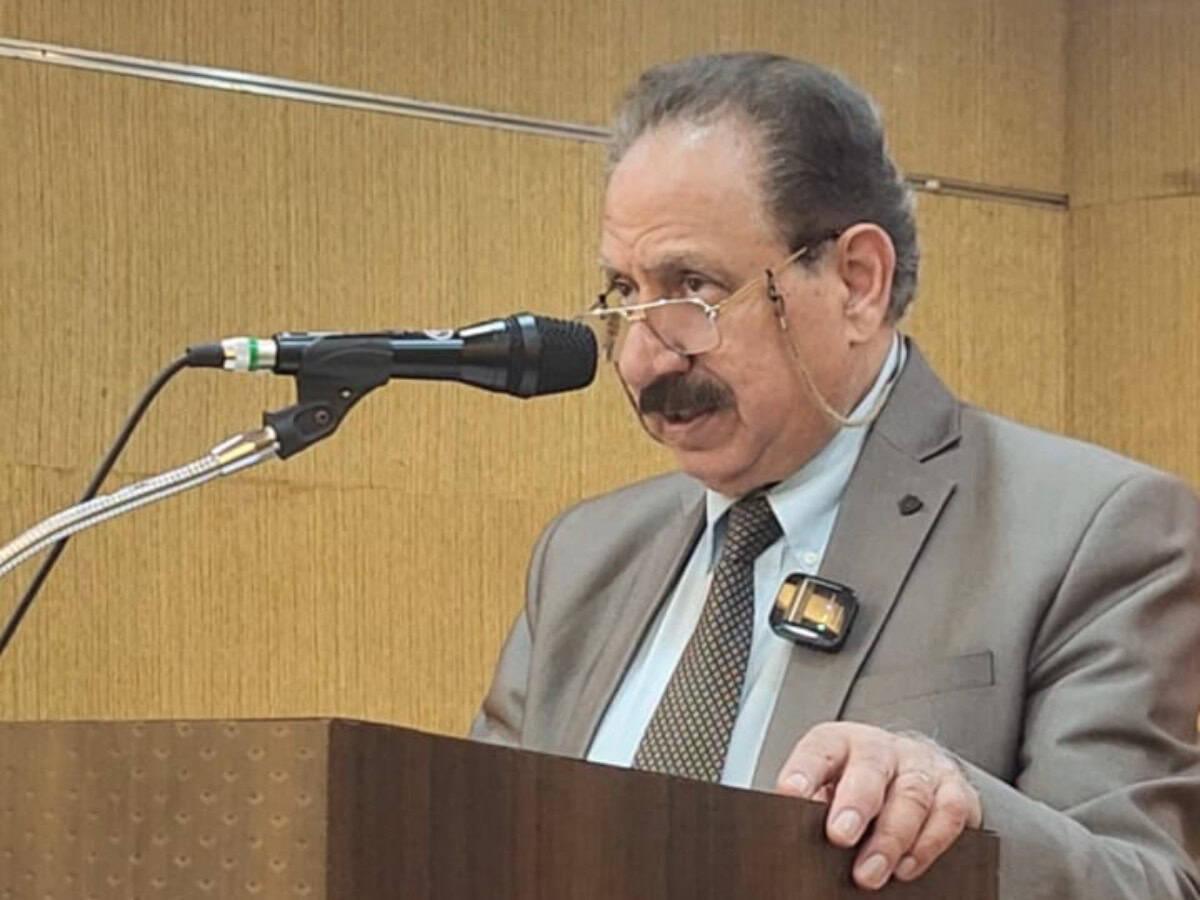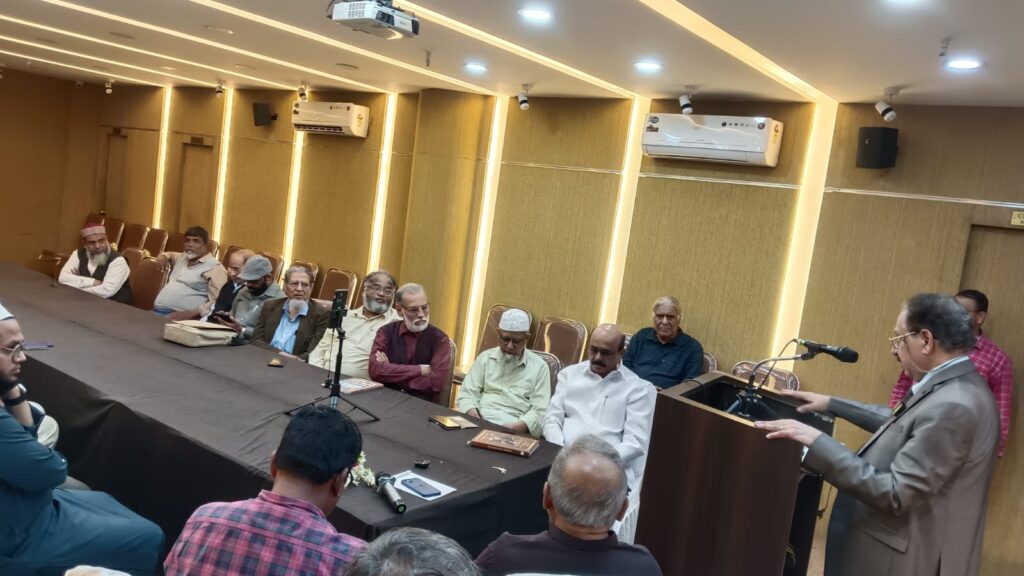
Hyderabad: In an era where ideological conflicts threaten to plunge humanity into the abyss of a third world war, the philosophy of Allama Iqbal offers a beacon of hope. Wars today are no longer waged for territorial expansion but fueled by deep-rooted ideological differences.
The absence of respect for human dignity further aggravates tensions, with conflicting narratives shaping perceptions—where a ‘mujahid’ for one nation becomes a ‘terrorist’ for another.
“Amid this chaotic landscape, Iqbal’s vision emerges as a remedy for fostering global peace and unity,” said Hyderabad-born Dr. Taqi Abedi, noted scholar, poet, and critic, who lives in Canada.
Extension lecture

He was delivering an extension lecture on ‘Iqbal’s relevance in present times’ here last evening. The address part of a series of lectures being organized by the Media Plus Foundation was attended by a galaxy of Iqbal aficionados, literary enthusiasts, and intellectuals. Dr. Fazil Husain Parvez, Editor Gawah, Prof. S.A. Shukoor, and Dr. Mohd Khaja Maqdoom Mohiuddin of Ambedkar Open University attended the programme.
Dwelling at length on Iqbal’s ideology, Dr. Abedi said the poet’s philosophy is built upon the foundation of human dignity, mutual respect, and unity, transcending regional, religious, and cultural boundaries. His concept of ‘Ihtiram-e-Adamiat’ (respect for humanity) emphasizes that all humans are inherently worthy of respect, a principle essential for resolving conflicts. His poetry and philosophy remind us of the shared humanity that binds us, urging nations to rise above their narrow self-interests and seek a collective path toward peace.
The relevance of Iqbal’s philosophy in today’s world cannot be overstated. As nations grapple with the challenges of ideological polarization, cultural misunderstandings, and diminishing human dignity, his message provides a roadmap for averting the catastrophe of another world war. Iqbal’s poetry and philosophy are a timeless source of wisdom, offering hope and solutions to a world desperate for peace.
Abedi is admirer of Iqbal
Dr. Abedi, who is an ardent admirer of Iqbal, presented the poet’s vision in an intellectually stimulating way. He liberally quoted Iqbal’s Urdu and Persian verses to give an insight into his philosophy and ideas.
He said Iqbal’s poetry warns against the pitfalls of materialism, and his vision advocates spiritual and ethical awakening to counterbalance the destructive tendencies of greed and domination.
Dr. Abedi emphasized that Allama Iqbal’s philosophy transcended geographical and cultural boundaries. He pointed out that the poet’s vision of a harmonious world is deeply rooted in the principles of mutual respect and understanding among nations. “Iqbal’s poetry is not merely about art; it is a call to action, urging humanity to rise above divisions and focus on shared values,” he stated.
Dr. Abedi highlighted several of Iqbal’s key ideas, such as the ‘khudi’ (selfhood) concept, which encourages individuals to realize their potential and contribute positively to society. He also underlined Iqbal’s critique of materialism and his advocacy for spiritual development as essential for global peace.
Conflicts plague world
“Ideological conflicts plague the world because we have forgotten the essence of humanity,” Dr. Abedi noted.
Iqbal’s ideas could be applied to contemporary global challenges, such as political instability, social inequality, and environmental degradation. Dr. Abedi urged educators and individuals to draw inspiration from Iqbal’s vision and work toward building a world where respect for humanity prevails.
An authority on Iqbal, Dr. Abedi expressed deep concern over the widening disconnect between the “Poet of the East” and today’s younger generation. Speaking passionately about this gap, he lamented that the youth have grown disinterested in Iqbal’s visionary works, despite his earnest prayers for the Almighty to instill his spirit and vision in them. “We are responsible for this situation,” Dr. Abedi remarked, urging introspection and action to revive Iqbal’s relevance.
He questioned why educational institutions, particularly madrasas, do not integrate Iqbal’s teachings into their curriculum alongside the Quran. Highlighting the profound connection between Iqbal’s poetry and Quranic principles, Dr. Abedi argued that such integration could revolutionize young minds. “If we study at least two verses of Iqbal daily and apply them in our lives, we will witness transformative changes,” he asserted.
Iqbal in India and Pakistan
Dr. Abedi pointed out the stark contrast between the approaches toward Iqbal in India and Pakistan. In India, he noted, there is an unfortunate hesitation to openly discuss Iqbal’s works, while across the border, efforts are being made to elevate their intellectual standing through his poetry. Yet, he observed, neither side is fully doing justice to Iqbal’s profound message and teachings.
Reflecting on the dismal state of the global Muslim community, Dr. Abedi pointed out that despite the presence of 57 Muslim-majority countries, the community remains powerless in addressing its challenges. He stressed that Iqbal’s philosophy holds the key to addressing these issues, warning against confining “Iqbaliat” (Iqbal’s teachings) solely to matters of faith.
“Iqbal is essentially a hakimul ummat (sage of community)”, Dr. Abedi explained, likening the poet to a physician of the Muslim world who not only diagnoses the ailments of society but also prescribes remedies. He quoted Iqbal’s verses to emphasize the need for spiritual awakening and self-realization:
Khuda tujhe kisi toofan se aashna kar de
Ke tere behar ki maujon mein izterab nahin
(May God introduce your soul to a storm
For the waves of your ocean lack turbulence.)
Meri surahi se khatra khatra naye hawadis tapak rahe hain
Main apni tasbeeh roz-o-shab ka shumar karta hoon dana dana
(New tidings come drop by drop from my pitcher
I count my beads of rosary day and night)
Iqbal believes in Haq
Allama Iqbal’s philosophy is firmly rooted in the pursuit of ‘haq’ (truth), no matter how bitter or challenging it may be. His mission was not merely the advocacy of Islam but the liberation of the human spirit, empowering individuals to rise above dependence and embrace their innate potential. For Iqbal, true independence was a spiritual awakening that freed humanity from servitude to anything but truth.
While his poetry is lauded for its profound depth and universal appeal, it often appears dry to those seeking mere entertainment. “Iqbal’s verses are not for those given to the enjoyment of qawwali, remarked Dr. Abedi, highlighting how the poet’s works resonate with those ready to confront reality and seek higher truths.
He urged the community to embrace Iqbal’s teachings as a guide to navigate contemporary challenges. By doing so, he believed, the younger generation can find direction, and the community as a whole can regain its strength and purpose in an increasingly fragmented world.



